|
|
|
Sort Order |
|
|
|
Items / Page
|
|
|
|
|
|
|
| Srl | Item |
| 1 |
ID:
172328


|
|
|
|
|
| Summary/Abstract |
Does exposure to violence motivate individuals to support further violence or to seek peace? Such questions are central to our understanding of how conflicts evolve, terminate, and recur. Yet, convincing empirical evidence as to which response dominates—even in a specific case—has been elusive, owing to the inability to rule out confounding biases. This article employs a natural experiment based on the indiscriminacy of violence within villages in Darfur to examine how refugees’ experiences of violence affect their attitudes toward peace. The results are consistent with a pro-peace or “weary” response: individuals directly harmed by violence were more likely to report that peace is possible and less likely to demand execution of their enemies. This provides microlevel evidence supporting earlier country-level work on “war-weariness” and extends the growing literature on the effects of violence on individuals by including attitudes toward peace as an important outcome. These findings suggest that victims harmed by violence during war can play a positive role in settlement and reconciliation processes.
|
|
|
|
|
|
|
|
|
|
|
|
|
|
|
|
| 2 |
ID:
196032


|
|
|
|
|
| Summary/Abstract |
Posttreatment variables are covariates that are preceded by the main explanatory variable. Their inclusion in a statistical model does not ‘control’ for their influence on the relationship of interest, and it does not substitute for a mediation analysis. Likewise, a coefficient estimate of an appropriate ‘control variable’ cannot be interpreted as a causal effect estimate. While these facts are well-established in various fields across the social sciences, their recognition in the field of peace and conflict studies is more limited. Originally collected data on recent publications from leading peace and conflict journals reveal that a large majority of evaluated articles condition on posttreatment variables, demonstrating how a review of these fallacies can help to substantially improve future research on peace and conflict. Drawing on a broad set of literature and using graphical approaches, I offer an intuitive explanation of the logic of posttreatment variables and clarify common misconceptions. Building on recent developments in methodology and software, and by deriving conditions for bounding using analytical bias expressions, I discuss avenues for dealing with posttreatment variables in observational studies. The article concludes with a discussion of implications for applied research.
|
|
|
|
|
|
|
|
|
|
|
|
|
|
|
|
| 3 |
ID:
162457
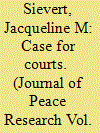

|
|
|
|
|
| Summary/Abstract |
Authoritarian regimes are not known for adopting independent courts, yet the frequency of states empowering their judiciaries has steadily increased. In 1961 only 9% of autocracies had a partially or fully independent court, but by 1987 more than one-third of authoritarian states had reformed their judiciaries. Initiating judicial reform is risky for a regime that seeks to maintain its authority over its populace, including risks to their preferred policy positions and judgments that run contrary to the preferences of the regime. Given these risks, why do authoritarian leaders often relinquish authority to independent courts? This article argues regime leaders will choose to empower at least nominally independent courts in order to resolve information problems that lead to bargaining failures and civil war. This project uses propensity score matching to account for the complex relationship between institutional arrangement and civil war, and finds that states that adopt an independent court reduce their risk of civil war between 54% and 75% when compared to states that are equally likely to have adopted an independent court, but did not. These results suggest that leaders seeking to reduce uncertainty when bargaining with potential oppositions groups have strong incentives to implement independent judiciaries, and improve our understanding of how and why authoritarian leaders choose to delegate authority to independent judicial institutions.
|
|
|
|
|
|
|
|
|
|
|
|
|
|
|
|
| 4 |
ID:
181668
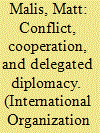

|
|
|
|
|
| Summary/Abstract |
Does diplomacy affect the prospects of international conflict and cooperation? Systematic empirical assessment has been hindered by the inferential challenges of separating diplomacy from the distribution of power and interests that underlies its conduct. This paper addresses the question of diplomacy's efficacy by examining the intragovernmental politics of US foreign policy, and the varying influence of diplomatic personnel in the policy process. I claim that diplomats hold the strongest preferences for cooperative relations with their host countries, relative to other participants in the foreign policy process. They also exert substantial influence over the formation and implementation of US policies toward their host countries but their influence is intermittently weakened by the short-term shock of an ambassadorial turnover. As a result, when ambassadors are removed from post, diplomacy is more likely to be eschewed for more conflictual means of settling international disagreements, and opportunities for economic exchange are less likely to be realized. I test this theory using newly collected data on US diplomatic representation, for the global sample of countries from 1960 through 2014. To address concerns of diplomatic staffing being endogenous to political interests, I leverage a natural experiment arising from the State Department's three-year ambassadorial rotation system. The turnover of a US ambassador causes a decrease in US exports to the country experiencing the turnover, and heightens the risk of onset of a militarized dispute between that country and the US. These findings point to bureaucratic delegation as an important but overlooked determinant of macro-level international outcomes.
|
|
|
|
|
|
|
|
|
|
|
|
|
|
|
|
| 5 |
ID:
141967
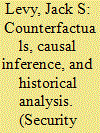

|
|
|
|
|
| Summary/Abstract |
I focus primarily on the utility of counterfactual analysis for helping to validate causal inferences in historical analysis. How can we use what did not happen but which easily could have happened to understand what did happen? With an infinite number of things that might have happened, and with temptations to construct “counterfactuals of convenience” to bolster one's preferred historical interpretations or political preferences, we need a set of rules or best practices for evaluating the scientific legitimacy of counterfactuals. Building on earlier work in several disciplines, I develop a set of criteria for the conduct of counterfactual analysis in historical case studies. The best counterfactuals begin with clearly specified plausible worlds involving small and easily imaginable changes from the real world. They make relatively short-term predictions based on empirically validated theoretical generalizations and on secondary counterfactuals that are mutually consistent. These counterfactuals are also sensitive to strategic behavior that might return history to its original course, and they are explicitly tested against competing counterfactuals.
|
|
|
|
|
|
|
|
|
|
|
|
|
|
|
|
| 6 |
ID:
162970
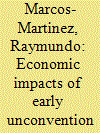

|
|
|
|
|
| Summary/Abstract |
Globally, the development of the unconventional natural gas (UNG) industry is expected to continue as gas consumption increases in the transition to cleaner energy sources. However, social and regulatory factors may constrain UNG activity at regional scales. Robust impact assessments of the effects of the UNG industry at different phases of development could help reduce trade-offs of energy policy and promote overall welfare improvements. We assessed if the early phases of the coal seam gas (CSG, a type of UNG) industry in New South Wales, Australia produced regional economic changes between 2001 and 2011. We combined spatial econometrics, genetic matching algorithms and seemingly unrelated regressions with instrumental variables to control for multiple factors influencing regional economic patterns (e.g., climate, human capital) to estimate the effect of the CSG industry on local income and employment. Results show that regions with CSG activity had 7% (±5%, 95% C.I.) higher family income than regions without CSG mining. No statistical evidence of indirect employment multiplier effects from CSG activity were found. The analysis can inform social license and regulatory decisions related to the CSG industry that impact competing social priorities such as energy and water security, economic growth and environmental health.
|
|
|
|
|
|
|
|
|
|
|
|
|
|
|
|
| 7 |
ID:
196785


|
|
|
|
|
| Summary/Abstract |
In the present era of climate change concerns, plug-in electric vehicles (PEV) and their associated infrastructure are strategic investments by many governments. Investment discussions often include the dynamic supply-demand relationship between PEV adoption and charging station deployment, but rarely is it given an empirical treatment. We make use of publicly available charging station installation and PEV vehicle registration data by U.S. County between the years 2012 and 2021 to examine the phasing and causal relationship between adoption trends in these two markets. Non-linear Granger causality tests suggest a feedback relationship between PEV vehicle adoption and charging station installations. It can be further explained that when individuals adopt PEV, the demand for the charging infrastructure increases to meet the demand for PEV. Conversely, when more charging station installations become available, it encourages adoption of this technology making it convenient for individuals to have access to these charging facilities. It is observed in aggregate that PEVs are penetrating across the U.S., but the penetration rate differs across states and counties. We examine this interaction using a generalized propensity score (GPS) identification strategy for the effect of charging station installations on PEV registrations, coupled with a generalized additive model (GAM) to construct a causal dose-response curve. We observe statistically significant effects on per capita charging station rates for income and total population. We suggest a policy package that includes charging infrastructure investments but also provides wider adoption of subsidies for low-income households across all states.
|
|
|
|
|
|
|
|
|
|
|
|
|
|
|
|
| 8 |
ID:
191375
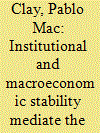

|
|
|
|
|
| Summary/Abstract |
Renewable energy (RE) auctions have become an increasingly popular policy instrument for decarbonizing the global energy matrix, and have been rapidly adopted by several countries worldwide. Previous research has used data from higher-income countries and two-way fixed effects models to estimate the impact of auctions on RE capacity, mostly with favorable results. However, these studies did not account for heterogeneous treatment effects across units to explore whether auctions are also effective in countries with unstable business environments. We analyze whether auctions also foster RE in countries experiencing macroeconomic instability or poor institutional quality. For this purpose, this study has drawn from multiple publicly available databases to build a dataset comprising 98 countries from 2000 to 2020. Our definition of RE includes solar, wind, and biomass sources. We first cluster countries by the quality of their business environment and then perform a differences-in-differences analysis considering staggered treatment adoption. We find that auctions positively affect RE capacity, yet the average treatment effects are higher for countries with better business environments. Thus, governments should exercise caution in adopting this instrument, especially in countries that experience macroeconomic or institutional instability. At the same time, dynamic treatment effects suggest that the policy needs time to show results.
|
|
|
|
|
|
|
|
|
|
|
|
|
|
|
|
| 9 |
ID:
192770
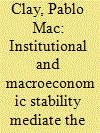

|
|
|
|
|
| Summary/Abstract |
Renewable energy (RE) auctions have become an increasingly popular policy instrument for decarbonizing the global energy matrix, and have been rapidly adopted by several countries worldwide. Previous research has used data from higher-income countries and two-way fixed effects models to estimate the impact of auctions on RE capacity, mostly with favorable results. However, these studies did not account for heterogeneous treatment effects across units to explore whether auctions are also effective in countries with unstable business environments. We analyze whether auctions also foster RE in countries experiencing macroeconomic instability or poor institutional quality. For this purpose, this study has drawn from multiple publicly available databases to build a dataset comprising 98 countries from 2000 to 2020. Our definition of RE includes solar, wind, and biomass sources. We first cluster countries by the quality of their business environment and then perform a differences-in-differences analysis considering staggered treatment adoption. We find that auctions positively affect RE capacity, yet the average treatment effects are higher for countries with better business environments. Thus, governments should exercise caution in adopting this instrument, especially in countries that experience macroeconomic or institutional instability. At the same time, dynamic treatment effects suggest that the policy needs time to show results.
|
|
|
|
|
|
|
|
|
|
|
|
|
|
|
|
| 10 |
ID:
171400


|
|
|
|
|
| Summary/Abstract |
Universal household electrification is a key component of the United Nations Sustainable Development Goals, but the evidence base for social and economic impacts of electricity access remains unclear. Here we report results from a systematic review of impact evaluations of household electrification based on five key outcome measures. We only find 31 studies that conduct statistical hypothesis tests to assess impacts. Among these, seven draw on a randomized experiment designed for causal inference. The randomized experimental studies generate fewer positive results than observational or quasi-experimental studies, such as correlational, instrumental variable, and difference-in-differences designs. These results call for a reassessment of what we know about the impacts of household electrification. They also call for major investment in impact evaluation of electricity access using randomized controlled trials, with a particular focus on when and how energy access interventions can furnish large benefits to their intended beneficiaries. Large-scale impact evaluations using experimental methods will require close collaboration between policymakers and researchers.
|
|
|
|
|
|
|
|
|
|
|
|
|
|
|
|
| 11 |
ID:
179870
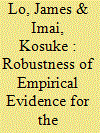

|
|
|
|
|
| Summary/Abstract |
The democratic peace—the idea that democracies rarely fight one another—has been called “the closest thing we have to an empirical law in the study of international relations.” Yet, some contend that this relationship is spurious and suggest alternative explanations. Unfortunately, in the absence of randomized experiments, we can never rule out the possible existence of such confounding biases. Rather than commonly used regression-based approaches, we apply a nonparametric sensitivity analysis. We show that overturning the negative association between democracy and conflict would require a confounder that is forty-seven times more prevalent in democratic dyads than in other dyads. To put this number in context, the relationship between democracy and peace is at least five times as robust as that between smoking and lung cancer. To explain away the democratic peace, therefore, scholars would have to find far more powerful confounders than those already identified in the literature.
|
|
|
|
|
|
|
|
|
|
|
|
|
|
|
|
| 12 |
ID:
167864
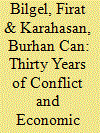

|
|
|
|
|
| Summary/Abstract |
This study seeks to estimate the causal effects of PKK separatist terrorism on economic development in Turkey using the synthetic control method. By creating a synthetic control group that reproduces the Turkish Gross Domestic Product (GDP) before PKK terrorism emerged in the late 1980s, we compare the GDP of the synthetic Turkey and the actual for the period 1955–2008. Our study finds that the Turkish per capita GDP would have been higher by about $2600 had it not been exposed to terrorism. This translates into an average of 21.4% higher per capita GDP over a period of 21 years.
|
|
|
|
|
|
|
|
|
|
|
|
|
|
|
|
|
|
|
|
|